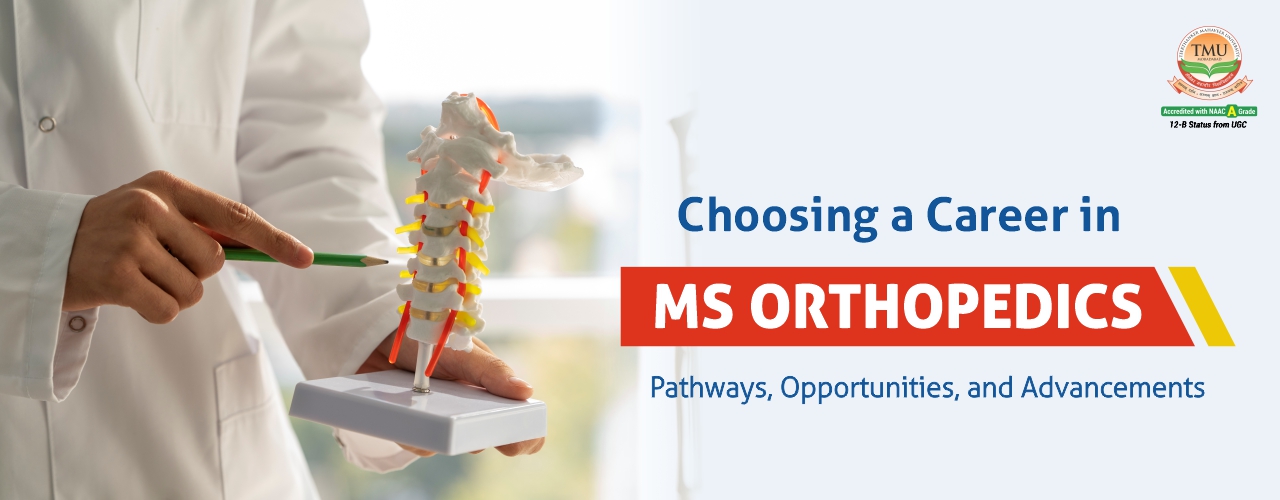Choosing a Career in MS Orthopedics: Pathways, Opportunities, and Advancements
Table of Contents
How long does it take to complete a residency or clinical training in MS Orthopedics?
MS Orthopedics refers to a postgraduate medical degree program that focuses on the study and practice of Orthopedics, which is the branch of medicine that deals with the prevention, diagnosis, and treatment of disorders and injuries of the musculoskeletal system. MS stands for Master of Surgery, and it is a recognized degree in the field of medical education. The average duration of residency or clinical training in MS (Master of Surgery) Orthopedics varies depending on the country and the specific training program. MS Orthopedics residency can last anywhere between 3 and 5 years. In India, the MS Orthopedics residency typically lasts three years. After earning their MBBS, doctors can specialize in MS Orthopedics through a three-year residency program. During this time, residents receive comprehensive training in all aspects of orthopedics, including clinical rotations, surgeries, research, and academic activities. It should be noted that the duration and structure of residency or clinical training can differ between institutions and countries. It is best to consult the specific guidelines and requirements of the relevant medical regulatory authorities or educational institutions in the country where you intend to pursue MS Orthopedics for accurate and up-to-date information on the duration of the residency program.
Teerthanker Mahaveer University
Apply for Admission
Click Here To Apply for Admission
Are there any prerequisites or recommended experiences for applying to MS Orthopedics programs?
Yes, there are specific prerequisites and recommended experiences that can strengthen your application for MS (Master of Surgery) Orthopaedics programs. While criteria vary by institution and country, the following are some common qualifications and recommended experiences: a medical degree, completion of an internship, clinical experience, research experience, letters of recommendation, and entrance examinations. It is important to note that the specific prerequisites and recommended experiences may differ between institutions, countries, and regulatory bodies. It is recommended that you thoroughly research the admission requirements and guidelines of the specific MS Orthopedics programs in which you are interested, and that you consult with the respective institutions or regulatory authorities for accurate and up-to-date information.
How are MS Orthopedics programs structured, and what is the training's focus?
MS Orthopaedics programs are designed to give specialized training in the field of Orthopaedic Surgery. The programs are designed to provide students with the knowledge, skills, and competence needed to diagnose, treat, and manage orthopedic illnesses and disorders.The particular structure and focus of the training can vary depending on the institution and country, but below is a broad overview:
- Duration: The duration of MS Orthopedics programs varies by country. In India, for example, the program typically lasts three years, whereas it may last longer in other countries.
- Clinical Rotations: MS Orthopedics programs include clinical rotations in various Orthopedic subspecialties. These rotations give students hands-on experience and exposure to various aspects of orthopedic care, including trauma, joint replacement, sports medicine, spine surgery, pediatric orthopedics, and more.
- Didactic Learning: Orthopedic programs frequently include didactic learning components, such as attending lectures, seminars, and conferences on relevant topics.
- Surgical Training: MS Orthopedics programs place a strong emphasis on surgical training, as Orthopedic Surgeons are trained to perform a wide range of surgical procedures.
- Research and Academic Activities: Programs may encourage or require residents to participate in orthopedic-related research, scholarly projects, or academic pursuits.
- Case Presentations and Conferences: Residents are frequently expected to present clinical cases, participate in case discussions, and attend orthopedic conferences and meetings.
- Exams and Assessments: To gauge the progress and competency of the residents in various facets of orthopedics, regular exams and evaluations, including written tests, practical exams, and clinical evaluations, are carried out.
What professions are open to graduates of an MS Orthopedics program?
Completing an MS (Master of Surgery) in Orthopedics opens up various career opportunities in the field of Orthopedic Surgery. Here are some of the career paths you can pursue after completing an MS Orthopedics program:
- Orthopedic Surgeon
- Fellowship Programs
- Academic and Research Careers
- Hospital Administration
- Industry and Medical Device Companies
It is important to remember that job opportunities can change depending on the nation, healthcare system, and personal preferences. Your career options and professional development in the field of orthopedics can be further increased by pursuing additional specialization, conducting research, or gaining experience in various subspecialties.
Are there any Orthopedics-related specialties or subspecialties that I could pursue?
Yes, you can pursue various specialized areas or sub-specialties within Orthopaedics in India. These sub-specialties concentrate on certain parts of Orthopaedics and allow for more specialization and experience. Joint Replacement Surgery, Sports Medicine, Paediatric Orthopaedics, Spine Surgery, Trauma and Fracture Surgery, Hand Surgery, and Musculoskeletal Oncology are some of the most popular sub-specialties within Orthopaedics in India. These are only a few examples of Orthopedic subspecialties. Pursuing more specialization in any of these areas necessitates additional training, which is frequently obtained through fellowship programs after completing the MS Orthopaedics program. You can gain competence in a specific area of Orthopaedics by specializing in a specific sub-specialty and contributing to specialized patient care, research, and developments in that field by specializing in a specific sub-specialty.
What costs are involved with MS Orthopedics programs in terms of fees and expenses?
The costs for MS (Master of Surgery) Orthopedics programs in India can vary greatly depending on a number of variables, including the institution, location, reputation, infrastructure, and facilities offered. The annual tuition for MS Orthopedics programs in India can range from about INR 5 lakhs to INR 25 lakhs. The fees can vary based on whether the institution is a government or private college, its ranking and reputation, infrastructure, and other factors. It is important to research and inquire directly with the specific institutions you are interested in for accurate and up-to-date information on the fees and expenses associated with their MS Orthopedics programs. There might also be loan options, financial aid plans, and scholarship opportunities available to help students manage their expenses while they are studying.
What factors should you consider when choosing an MS Orthopedics college?
There are many factors to take into account when choosing the best MS (Master of Surgery) orthopedics college in India. These criteria can help you make an informed decision and choose a college that aligns with your academic and career goals. The Teerthanker Mahaveer Medical College & Research Center, which is accredited by the Ministry of Health and Family Welfare, opened its doors to MBBS students in 2008 at TMU, Moradabad. The three-year MS Ophthalmology program provides a solid scientific foundation in ophthalmology fundamentals. The training includes a careful analysis of anatomy, physiology, and eye disorders. Students who complete this program gain clinical expertise and are prepared to diagnose patients and provide them with the best possible care. There will always be a need for ophthalmologists and job opportunities because the world's population is increasing every day. Residents can pursue fellowship studies in ophthalmology subspecialties once their residency program is over. Graduates must possess a medical degree and successfully complete a residency program in order to become licensed medical practitioners. It is important to thoroughly research and visit multiple colleges, if possible, to get a firsthand understanding of their offerings and suitability for your requirements. In order to gather more information and make an informed decision, consult with mentors, professionals in the field, and trusted advisors.
What topics does the MS Orthopedics curriculum cover?
In India, the MS (Master of Surgery) Orthopedics curriculum typically covers a broad range of Orthopedic subjects and topics. The curriculum is intended to provide in-depth knowledge and training in the field of orthopedic surgery. The MS Orthopedics curriculum generally covers the following topics: Basic Medical Sciences, Orthopedic Clinical Sciences, Orthopedic Surgical Techniques, Orthopedic Subspecialties, Orthopedic Disorders and Diseases, Research Methodology and Biostatistics, Ethics, and Professionalism.The specific subjects and their depth may vary slightly between different universities or institutions. There may also be clinical rotations, postings, and practical training opportunities in various orthopedic departments and affiliated hospitals. These hands-on learning opportunities give students the chance to put their theoretical understanding into practice in actual clinical settings, watch operations, help with procedures, and hone their clinical skills under the supervision of knowledgeable faculty. It is significant to note that different institutions offering the MS Orthopedics program may have different exact subjects and their sequencing. It is advised to consult the institution's specific curriculum if you want more in-depth information.
To read more such blogs, please visit:TMU Blogs.















